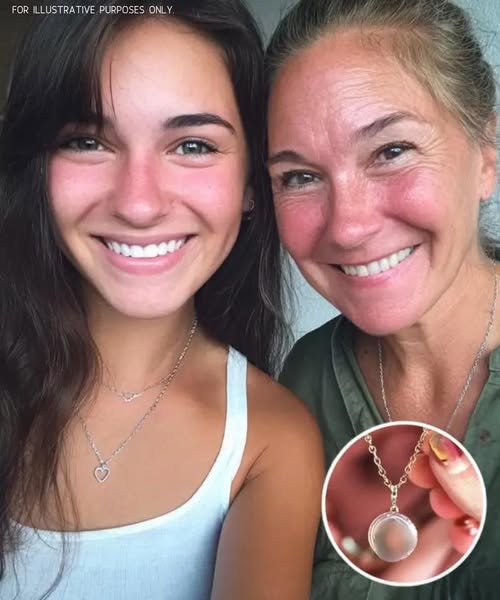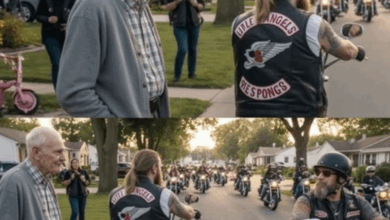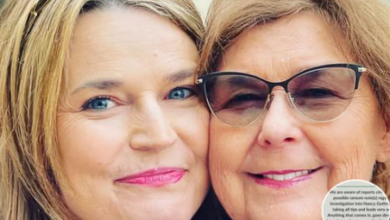
She Was Just A Lost Girl Until I Saw My Missing Mother’s Locket Around Her Neck
I was thirty-five, unemployed, and dragging around a résumé so awkward even I’d stopped believing in it. A few years ago, I was a respected designer—booked solid, award-winning, confident in a room full of clients. Now, I was lucky to get a phone screening.
“You’ve got solid experience,” the recruiter would say, eyes darting to the screen, “and this is… what, a speech issue?”
“It’s just a stutter,” I always wanted to say. But most of the time I just nodded, cheeks hot, willing the interview to end. My thoughts moved faster than my mouth could chase, and the gaps between my syllables always filled the air with discomfort.
The stuttering hadn’t always been there. It started three years ago—the day my mother left.
She hadn’t stormed out or slammed the door. She just packed a light bag, smoothed her blouse, and kissed my forehead.
“I’ll be back soon, sweetheart. Just need to… clear my head.”
She never came back.
No note. No calls. Just silence.
I searched the neighborhood. Phoned every hospital in a fifty-mile radius. Walked the forest line near the old bridge. Filed a missing person report that yielded no updates. Eventually, people stopped asking, and I stopped answering. The only thing left was the faint scent of her perfume on the armchair and an unfinished pie hardening in the fridge.
Time passed, but I stayed there. Emotionally, I remained wedged between that stale dessert and the phone that never rang.
Rachel tried, in her usual blend of tough love and soft concern. She came over weekly with coffee and pep talks, nudging me toward the world I’d abandoned.
“You have to move,” she’d say, tugging open my curtains. “Not to forget her, but for you. Take one step. Go for a jog. Jogging is meditation for people who overthink.”
I stared at my laptop screen, refreshing the weather.
“They say there might be a storm,” I mumbled.
“People run in all kinds of weather. What’s really stopping you?”
And s that evening, for the first time in months, I stood on my doorstep. The wind was thick, electric. Clouds, like bruises, hung low in the sky. I hesitated, watching the trees sway like warning signs.
“This is only wind,” I told myself. “If I skip today, I’ll never start.”
So I ran.
It wasn’t pretty. I was clumsy and out of breath before the first mile. My hoodie flapped, and my legs already ached. But I was moving.
I passed shuttered cafés, graffiti-tagged walls, flickering streetlights. The playground appeared ahead, rusted and overgrown. I meant to run past it, but something tugged at the corner of my vision.
There, on the swing, sat a small girl.
She looked impossibly tiny, no older than three or four. Pale pink jacket, pigtails, legs too short to touch the ground. She swung slowly, alone, her fingers curled tight around the chains.
I froze.
What child was out here by herself, this close to a storm?
I approached, careful not to startle her.
“H-h-hi there, s-s-sweetie…” My voice cracked and stammered like it always did when I was nervous.
She looked up, solemn and curious, watching my face like she was studying my mouth.
“A-a-are you here… alone?”
She gave a tiny shrug.
There was no one in sight—no stroller, no mother calling, no open door. The wind picked up, and the swing creaked mournfully.
I crouched, lowering myself to her eye level. “It’s dangerous to be out here. Do you know where your… family is?”
She blinked.
“I’m Emily,” I said gently. “What’s your name?”
“Mia,” she whispered.
Then the sky cracked with thunder. The park lights flickered and went out entirely, leaving us in a dull haze of twilight.
“Mia, sweetheart, we have to go. It’s not safe to stay.”
“I don’t know where to go,” she said, voice barely audible.
“I have cookies. And milk. Would you like some?”
Her tiny head nodded.
I took her hand—small, cold—and she let me. I lifted her up as the rain began to fall, light at first, then harder, stinging against my cheeks.
We started running, huddled together. As I shielded her from the wind, something silver glinted beneath her jacket. A locket.
It swung out slightly, catching the light.
I stopped mid-stride.
I knew that locket.
I had given it to my mother on her 50th birthday—custom-engraved, oval-shaped, with tiny vines curling around the edge. Inside was a photo of the two of us from my college graduation.
I swallowed. “Mia, can I see your necklace?”
She hesitated, then pulled it out from under her jacket.
I opened it with trembling hands.
On one side was the photo of Mom and me.
On the other… a portrait of Mia.
My breath left my lungs.
“Where… did you get this?”
Mia looked afraid. “It’s Mommy’s.”
I stared at her. My brain couldn’t catch up with the implications.
Was she Mom’s daughter? My sister?
What had my mother been doing all this time?
By the time we reached my apartment, the rain had turned into a downpour. We were soaked, dripping, shivering. I dropped my keys twice before finally unlocking the door.
“Sorry,” I said, out of habit. “I… I don’t usually have guests.”
Mia said nothing. She just looked at me, calm and curious.
I peeled off her jacket and draped a towel over her shoulders.
The locket still glinted. A ghost in silver.
I called emergency services.
“I found a child alone in the park,” I told them. “She’s maybe three. She had a locket… with photos of my mother.”
They took my information and promised to send help—but warned that due to the storm, responders were delayed.
“Please keep her safe indoors,” they said. “Someone will come as soon as possible.”
I turned to Mia. “Well. It’s you and me for a while.”
She looked up and smiled faintly.
“Are you hungry?”
She nodded.
My fridge was a sad museum of expired condiments and bottled water. I pulled out a frozen pizza, turned the oven on, and offered her the couch. She removed her wet socks with practiced ease and tucked her legs under the blanket like she’d done it a thousand times.
I rummaged in the closet and found a forgotten teddy bear, a set of old pajamas I hadn’t donated, and a stack of picture books.
I laid them beside her.
“This is all I have,” I said quietly.
“It’s okay,” she whispered.
After diner, she curled up and fell asleep holding the bear. Her breathing slowed, rhythmic and soft.
I opened the locket again, just to be sure I hadn’t imagined it. But the photos were still there.
I sat on the armchair across from her, the storm raging outside, and tried to make sense of what this meant.
At 5 a.m., the phone rang.
“We’re from Child Protective Services. We’re almost at your address.”
I opened the door to two caseworkers—and behind them, someone who made my knees buckle.
My mother.
She looked older. Fragile. Gray-haired. Her eyes unfocused. But it was her.
“She’s my mother,” I said, stunned.
One of the caseworkers explained gently. “She’s been suffering from advanced Alzheimer’s. The person who was caring for her passed away last week. We believe she wandered off with Mia.”
When Mia saw her, she lit up.
“Mommy!” she squealed, running to hug her.
My mother’s expression softened. She placed a trembling hand on Mia’s head and whispered, “My sweet girl.”
I turned to the caseworker. “What happens now?”
“Mia has no official guardian. The court will decide.”
“I’ll take her,” I said, voice clear. “She’s my sister.”
They paused. Then nodded.
As they took Mom to a clinic, Rachel arrived at my door, coffee in hand.
She took one look at me, at Mia curled on the couch, and gave me a hug.
“I don’t know what I’m doing,” I admitted, tears finally breaking free.
“You’re living again,” she said. “And you’re not doing it alone.”
We sood in silence, watching as dawn broke through the clouds.
And Mia, from under the blanket, peeked up to see if I was still there.
I was.
And I would be.
The road ahead would be uncertain. But at least now, we had each other—and a reason to begin again.




